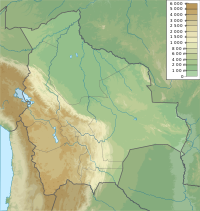Pacha Qullu (Aymara pacha world; time, qullu mountain,[2][3] Hispanicized spellings Pacha Kkollu,[4] Pacha Kollu, also Pacha Kkollu Quimsa Misa) or Kimsa Misa (Aymara kimsa three, misa offering[3][5] also spelled Quimsa Misa) is a 4,702-metre-high (15,427 ft) mountain in the Andes of Bolivia. It is located in the Oruro Department, Litoral Province, Huachacalla Municipality, west of Huachacalla (Wachaqalla). Pacha Qullu lies northwest of Inka Qhamachu.[6] The plain at 18°42′44.86″S 68°34′25.21″W / 18.7124611°S 68.5736694°W northwest of Pacha Qullu is named Kimsa Misa Pampa (Quimsa Misa Pampa).[7]
| Pacha Qullu | |
|---|---|
| Kimsa Misa | |
 The village of Huachacalla with the eastern slopes of Pacha Qullu in the background | |
| Highest point | |
| Elevation | 4,702 m (15,427 ft)[1] |
| Coordinates | 18°47′44″S 68°18′22″W / 18.79556°S 68.30611°W |
| Geography | |
| Parent range | Andes |
The mountain is a volcano. While the date of the last eruption is not known, the degree of erosion suggests an age of about 8.3 million years. Originally the mountain was about 89 metres (292 ft) higher and had a volume of 37.4 cubic kilometres (9.0 cu mi).[8] Pacha Qullu is a Pliocene age volcano. Its slopes range 11–16°, formed by lava flows and pyroclastic material. Erosion has carved radial gullies into its flanks, at whose ends alluvial fans have formed.[9] The volcano has suffered a sector collapse, resulting in the formation of a 2.4 kilometres (1.5 mi) wide and 4.7-kilometre-long (2.9 mi) breach.[10]
Temperatures in the closely located city of Oruro range 4–12 °C (39–54 °F), and precipitation is 400–100 millimetres (15.7–3.9 in). The area is very windy. This climate has led to a xerophytic vegetation, including shrubs and tussock grass.[9]
References
edit- ^ Bolivian IGM map 1:50,000 Huachacalla 5937-IV
- ^ "Diccionario Bilingüe, Castellano - Aymara, 2002". Félix Layme Pairumani. Archived from the original on 2013-09-02. Retrieved January 18, 2016.
- ^ a b Radio San Gabriel, "Instituto Radiofonico de Promoción Aymara" (IRPA) 1993, Republicado por Instituto de las Lenguas y Literaturas Andinas-Amazónicas (ILLLA-A) 2011, Transcripción del Vocabulario de la Lengua Aymara, P. Ludovico Bertonio 1612 (Spanish-Aymara-Aymara-Spanish dictionary)
- ^ Carola Dörrie, Boden und Vegetation im Bereich von Huachacalla (Altiplano - Bolivien) - unter besonderer Brücksichtigung der Bodenversalzung, Band I, Düsseldort 2001 (in German)
- ^ Narciso Valencia Parisaca, La Pachamama: Revelación del Dios Creador, Colección Iglesias, pueblos y culturas, No. 52-53, Quito, Ecuador, 1998
- ^ "Huachacalla". Archived from the original on 2016-03-04. Retrieved January 18, 2016.
- ^ Bolivian IGM map 1:50,000 Negrillos 5837-I
- ^ Karátson, D.; Telbisz, T.; Wörner, G. (2012-02-15). "Erosion rates and erosion patterns of Neogene to Quaternary stratovolcanoes in the Western Cordillera of the Central Andes: An SRTM DEM based analysis". Geomorphology. 139–140: 122–135. doi:10.1016/j.geomorph.2011.10.010.
- ^ a b Rossi, Matti J.; Kesseli, Risto; Liuha, Petri; Meneses, Jédu Sagárnaga; Bustamante, Jonny (October 2002). "A preliminary archaeological and environmental study of pre-Columbian burial towers at Huachacalla, Bolivian Altiplano". Geoarchaeology. 17 (7): 633–648. doi:10.1002/gea.10032.
- ^ Francis, P. W.; Wells, G. L. (1988-07-01). "Landsat Thematic Mapper observations of debris avalanche deposits in the Central Andes". Bulletin of Volcanology. 50 (4): 261. doi:10.1007/BF01047488. ISSN 0258-8900. S2CID 128824938.
